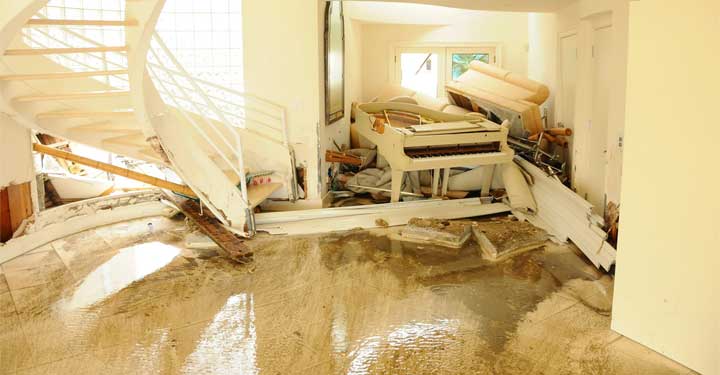Flood Damage vs Water Damage

Usually, when your house is damaged by water from inside, people call it flood damage. But, are they right? In terms of legal definitions, these kinds of damage have several peculiarities. So, let's check them out while comparing flood and water damage.
Flood Damage vs Water Damage: Are They Similar?
In the practice of American insurance companies, these two concepts have significant differences. Therefore, considering them as synonyms is definitely wrong.
First, let's define the key factors enabling to distinguish the differences in the flood damage vs water damage battle. They are as follows:
- What factors have caused the presence of water in your home?
- What kind of damage has been caused by the water?
- Who is to blame for the causes of flooding or water damage?
Now let's consider each type of damage separately.
What Is Water Damage?
When you apply to an insurance company to be compensated for water damage, it is important to understand why it has occurred and what kind of damage is considered water damage.
The causes of water damage most often lie in the house itself. This could be a pipe break or a leak in your dishwasher. Toilet overflows are also related to water damage, as well as leaks in the roof, walls or ceiling. Thus, if water is dripping from your roof, it is not flooding. But, it is quite another matter if the roof has been blown off by a hurricane, and the water from the downpours has flooded the house starting from the floor due to the rise of groundwater. Similarly, flooding in a condominium due to the neighbors' fault is also water damage, because its cause is a purely human factor. And this is the most important difference between the two types of damage.
Now let's consider what kind of damage is caused by water. Water rarely fills all rooms and reaches a significant height because of leaks or sewerage breakthroughs.
Sometimes these kinds of leaks can lead to the accumulation of water in the basement, but the height of the water level in case of water damage is always lower than in case of a flood. In addition, water damage is considered to be one that occurs above ground level, i.e. even if your pipe bursts and the entire floor in the house is flooded with water, this is not a flood. Accordingly, such damage primarily affects your furniture, household appliances, interior finishes of walls and ceilings.
Who is responsible for water damage? Least of all, these are the forces of nature. Most often, the cause and culprit is either an unscrupulous homeowner, who did not provide proper maintenance of the sewerage or plumbing, or poor quality of household appliances or plumbing pipes, sometimes condominium neighbors.
Summing up, we can state that water damage is the damage caused by a source of water which is related to either domestic plumbing/sewage or household appliances. An exception is water damage happening due to a leaking roof, windows, or cracks in walls and foundations.
What Is Flood Damage?
Now let's figure out what flood damage is. According to the FEMA classification, a flood is considered to be the filling of living quarters with water due to a sharp rise in the water level in a neighboring reservoir or a rise in groundwater. Accordingly, flood cases are encountered in the practice of insurance companies much less frequently than water damage cases. In any case, the cause of flood damage is natural disasters. These include:
- heavy tropical downpours leading to overflowing river banks,
- tsunami,
- seasonal rise in the water level of rivers and reservoirs above the critical level,
- dam failures.
Many American states are not subject to any of the above mentioned phenomena. But there is a number of states where the threat of flooding is high.
Flood damage is always much more severe than water damage. First of all, it affects more than just your home. If a river is overflowing, your neighbors are likely to suffer as well. In addition, a flood is accompanied by the following factors:
- mud streams,
- river flooding or a high tide on the coast,
- sharp accumulation of surface waters on the land surface.
As a result, any house suffers much more from the flood, because the water level during flooding can be catastrophically high and lead to severe damage not only to the interior but also to the walls and foundations of the house.
Specifics of Insurance Coverage for Water and Flood Damages in the US
Another key difference between flood damage and water damage is the insurance terms for each of these cases.
To compensate for water damage, it is sufficient to have a standard homeowners insurance policy. If the damage was caused by a sudden cause, and the policyholder is not to be blamed for the situation, the insurance company will cover the damage in full.
As to flood damage cases, things are much more complicated. This kind of damage is not covered by a standard homeowners insurance policy. But, if your state or county is at risk of flooding, you can always conclude an additional contract with the insurance company and buy a special flood insurance policy. Such a program was included in the list of insurance options in accordance with the NFIP requirements. Therefore, if floods occur more often than once every couple of years in your region, it will not be superfluous to purchase such an insurance policy.
